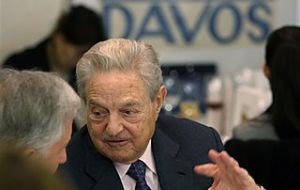MercoPress. South Atlantic News Agency
Soros backs Obama’s proposals to limit size of banks
 The legendary financer said major economies would have to agree on a common set of financial regulation (AP)
The legendary financer said major economies would have to agree on a common set of financial regulation (AP) Legendary investor George Soros has called for a radical break-up of banks that are “too big to fail”. He also backed US President Barack Obama's proposed reforms to limit the size of banks at the World Economic Forum in Davos.
Speaking at a private lunch, Mr Soros told journalists that Wall Street bankers opposing Mr Obama's plans were “tone-deaf”.
Analysing attempts to overcome the crisis, Mr Soros had plenty of praise for Mr Obama's plan to split big banks - separating their commercial banking bits and their investment arms.
Even after the break-up proposed by Mr Obama, most investment banks would “still be too big to fail,” Mr Soros told the lunch guests.
To contain these banks, he said all major economies would have to agree on a common set of financial regulation that set strict limits for leverage - how much money the banks can borrow to invest.
Without a global agreement, capital would simply move to the least regulated country.
However, if all major economies participated, they could exercise the necessary controls over money flow to prevent rogue states from circumventing the system - or stop “Goldman Sachs from setting up shop in Somalia,” as one of the participants called it.
Mr Soros called the current economic crisis a “super bubble” that had been “generated by the system itself,” and was the culmination of 25 years of “smaller bubbles” and misguided attempts to tackle them.
These bubbles had been caused by easy credit and highly-leveraged deals, where investors borrow a multiple of their own money to finance an investment.
Both regulators and bankers had the “misconception” that markets are efficient, Mr Soros said, and had been blinded by their “ideology” of “market fundamentalism,” assuming that markets should always be lightly regulated.
Whenever a bubble burst, governments and regulators made the situation even worse by cutting interest rates and making money even cheaper - until the sub-prime mortgage bubble brought the whole system down, he said.
Mr Soros praised two UK regulators - Lord Adair Turner of the Financial Services Authority and Bank of England governor Mervyn King - for understanding the crisis and developing good policies to prevent a repeat.
With the current easy money policies, “banks are allowed to earn their way out of a hole, and they do so with astonishing rapidity,” Mr Soros said.
However, banks had made the mistake of treating these profits as if they had actually earned them themselves, and that had created a political storm that would be difficult to contain.
Mr Soros warned that politicians could easily find themselves pushed into hasty and ill-considered regulations. It would also be wrong to impose high taxes on bank profits just yet. “We are not out of the woods yet,” he said.
Mr Soros said it would be difficult to establish the correct ceiling for leverage that banks should have, but argued that governments had now enough time to develop a global regulatory system.
He compared any new system to Bretton Woods, the global economic system agreed at the end of World War II.
Mr Soros, a billionaire philanthropist, is most famous in the UK as the “the man who broke the Bank of England” for his role forcing the pound out of Europe's exchange-rate mechanism in 1992




Top Comments
Disclaimer & comment rulesCommenting for this story is now closed.
If you have a Facebook account, become a fan and comment on our Facebook Page!